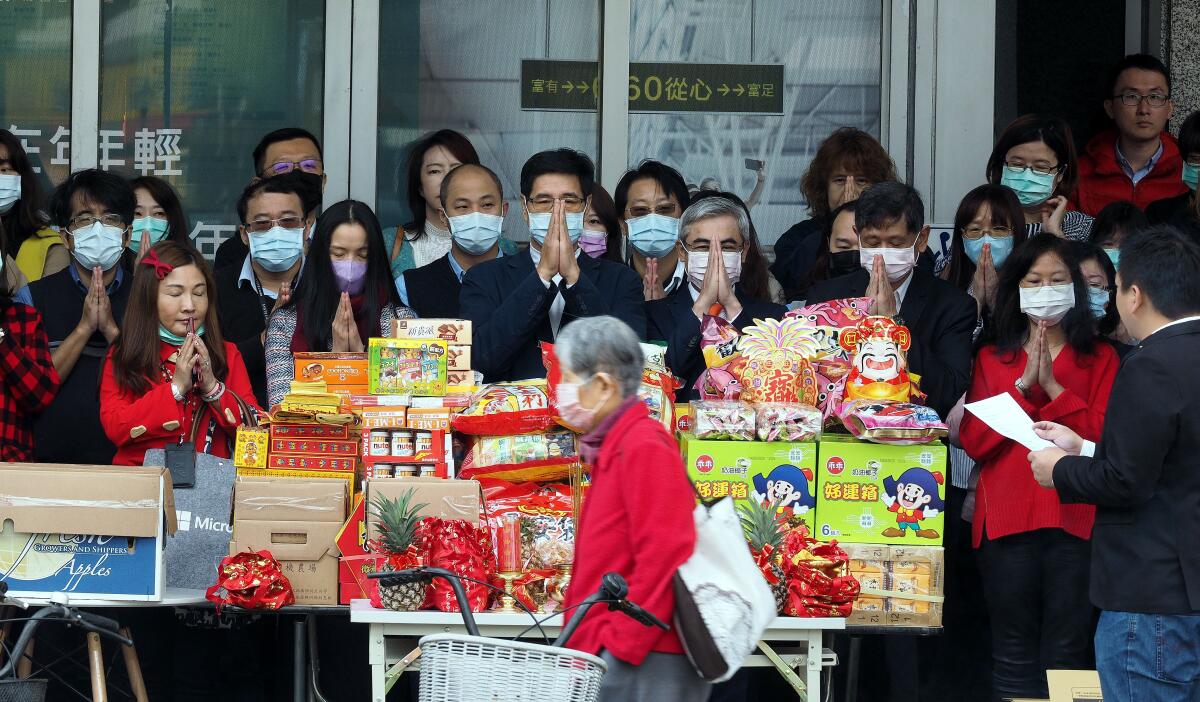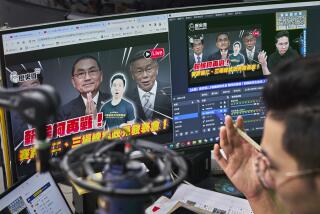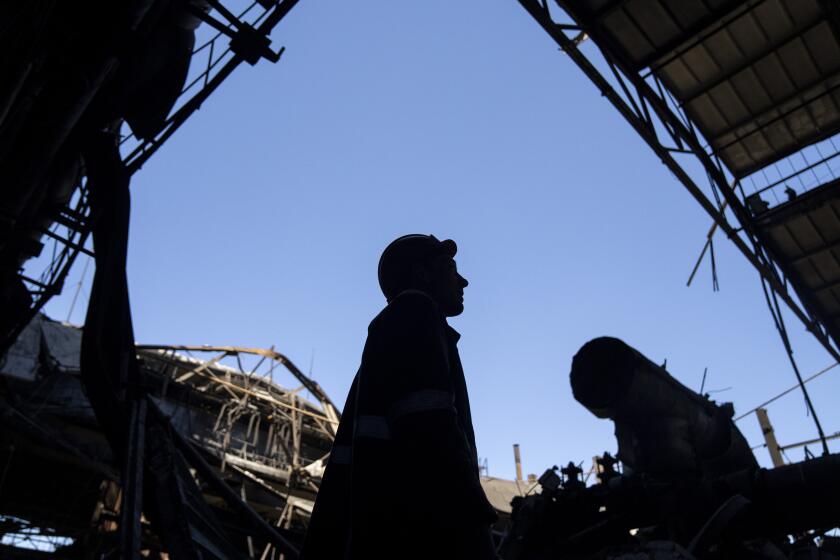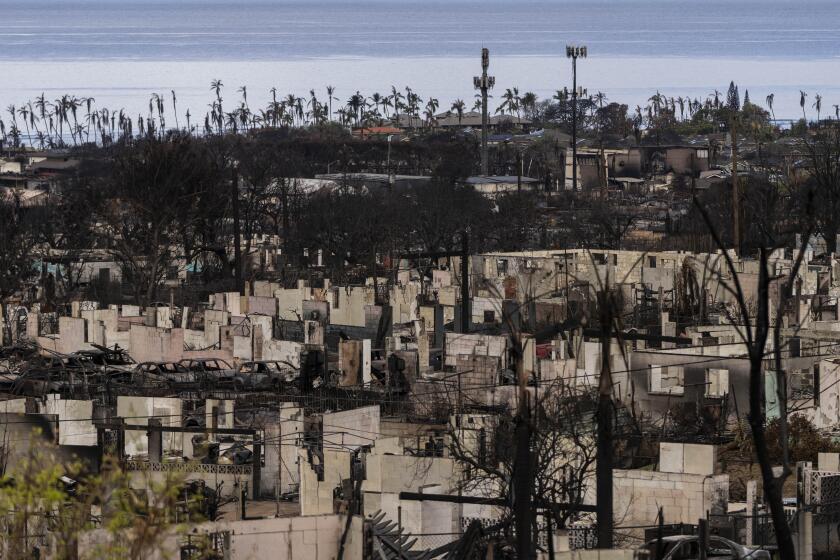Taiwan tries to keep coronavirus out while asserting itself against China

The playgrounds are full. People linger in cafes for hours. Many are not wearing surgical masks.
Yet fear lurks beneath the surface of this democratic island of 23 million people, separated from China by a narrow strip of ocean.
The political and military threat posed by Taiwan’s much larger neighbor is now compounded by an unseen enemy arriving with the flow of travelers in a tightly connected cross-straits economy.
Since the deadly new strain of coronavirus began spreading from its epicenter of Wuhan, China, in January, the Taiwanese government has been scrambling to react. At first, officials declared there was an adequate supply of surgical masks to protect people. Then, they restricted purchases to two a week.
Long lines formed at pharmacies, with some stocking up on toilet paper in the mistaken belief that it could be used to construct makeshift masks.
There have been 18 confirmed coronavirus cases in Taiwan and no fatalities, compared with nearly 40,000 cases and more than 900 deaths on China’s mainland.
Desperate to keep the virus at bay, Taiwanese officials are severely restricting travel from China and have barred mainland Chinese visitors. School holidays have been extended to the end of the month.
Hundreds of thousands of Taiwanese who work in China are worried about their livelihoods. What’s more, Taiwan is facing a public health crisis while being shut out of the World Health Organization. China considers Taiwan a renegade province and blocks it from joining WHO, the United Nations and other international organizations.
Consequently, Taiwan’s ability to share information with WHO is limited, and it is lumped in with China in WHO health advisories. One repercussion: Italy has banned flights to and from Taiwan, leaving many Taiwanese tourists stranded.
In unusually direct language, Taiwanese Foreign Minister Joseph Wu has accused WHO of violating its own mission statement.
“If the motto of the WHO is ‘health for all’ and ‘leaving no one behind,’ well, the Taiwanese people are certainly not treated that way…. I would like to publicly call upon the WHO to recognize the simple fact that Taiwan is Taiwan and it is not part of the PRC,” Wu said at a news conference last week, using the initials for the People’s Republic of China.
Taiwan President Tsai Ing-wen has a mandate to push back against China after having been reelected Jan. 11 in a landslide against Kuomintang party candidate Han Kuo-yu. The president’s independence-leaning Democratic Progressive Party does not support China’s precondition for negotiations — that Taiwan acknowledge there is only one China.
The Tsai administration’s assertive statements about WHO should play well to its base and beyond, said Lev Nachman, a doctoral candidate in political science at UC Irvine and a Fulbright research fellow in Taiwan.
It is too soon to give a verdict on the government’s overall handling of the coronavirus crisis, Nachman said. But regardless of the outcome, it will almost certainly be a talking point for the Democratic Progressive Party in the future, just as the Hong Kong pro-democracy protests were in the last election.
“This also serves that kind of frame of, this is why creating close ties with China is bad for Taiwan,” Nachman said.
For Taiwanese already wary of China, the coronavirus outbreak and the Chinese government’s handling of it strengthen their desire to maintain a distance from the mainland.
“From African swine fever to the Wuhan virus, we actually have no faith in China’s ability to control outbreaks,” said DPP legislator Lee Chun-yi, referring to a disease that devastated China’s pigs last year.
Taiwanese perceptions that China has withheld information about the new coronavirus outbreak are adding to mistrust between the two sides, said William Sharp, an Asia specialist at the University of Hawaii.
“I think this thing will tone down,” he said, “and people on both sides will try for better communication, but how long that will take, I just don’t know.”
Even some who want closer ties with China support the Tsai administration’s walling off of travelers from the mainland.
“If the Tsai Ing-wen government’s reaction is not too far over the top, then I can accept that,” said Huang Kwei-bo, vice dean of the international affairs college at National Chengchi University in Taipei, who was a policy advisor for the Han campaign.
Where the government has fallen down, many observers agree, is on masks.
Political talk show “Situation Room” host Jaw Shaw-kong displayed posters featuring Premier Su Tseng-chang early in the outbreak.
In one, Su asserted that the country had enough face masks, with 45 million on hand. He urged people to wash their hands and wear masks.
Later, officials changed their tune, banning mask exports and deploying soldiers at mask factories around the clock. They rationed masks, limiting people to three a day before instituting the two-a-week system on Thursday.
Public service announcements feature doctors who advise that masks are necessary only in crowded areas, or for those with a chronic health condition or who are coughing and sneezing.
“Now that you don’t have enough masks, you say there’s no need to wear one,” said Jaw, a former Kuomintang legislator who is now an independent. “Are we supposed to believe you?”
Medical experts generally concur with the government’s latest advice that masks are needed only in certain situations.
Masks should be worn by medical workers and at crowded events, but otherwise, the danger is minimal in Taiwan because the virus has not spread into the general population, said Chiu Cheng-hsun, a professor and doctor with the Linkou Chang Gung hospital’s children’s respiratory disease department.
The government’s mask rationing has set off unnecessary panic among consumers, said Joanna Lei, chief executive of the Chunghua 21st Century Think Tank in Taiwan and a former legislator who has been affiliated with the Kuomintang and the New Party, a Kuomintang offshoot.
“Certainly, the No. 1 rule in an outbreak like this is to provide information rather than disinformation,” she said. “You have to stash masks … because the government may go into other rationing down the road and create mass hysteria.”
Amid all the worries and blame, the situation has provided some amusing moments. After dousing his car in alcohol-based disinfectant, a Taiwanese man failed a breathalyzer test at a DUI checkpoint, local television news reported.
At Daan Forest Park in Taipei last week, Yuching Huang watched his two young daughters ride bicycles. The three were not wearing masks. Huang said he saved them for crowded places and was not especially concerned about catching the virus.
“Taiwan’s sanitation is pretty good. People’s hygiene is pretty good,” said Huang, 38, a tap dancer.
Huang said he had enough masks at home, especially with the recent elections and Taiwanese politicians’ penchant for distributing promotional face masks to passersby.
Last week, the Kuomintang banned such handouts for the party’s candidates, saying masks should be conserved for medical workers.
More to Read
Start your day right
Sign up for Essential California for news, features and recommendations from the L.A. Times and beyond in your inbox six days a week.
You may occasionally receive promotional content from the Los Angeles Times.







